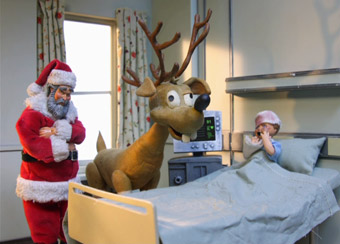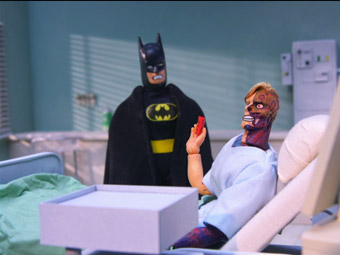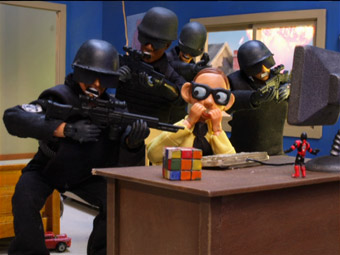|
It's hard not to have a soft spot for the multi-talented Seth Green. His low key performance and engagingly offbeat looks were part of what, at least for for this jaded viewer, made Oz far and away the most interesting and likeable character in Buffy the Vampire Slayer, while his turn as the disgruntled Scott in Austin Powers: International Man of Mystery gave rise to some of the first film's most memorable moments. And I'd been watching Seth McFarlane's animated TV series Family Guy for some months before I realised that is was Green who provides the squeaky voice of eldest son Chris Griffin.
It was through the infectious enthusiasm of a small group of media students that I discovered the delights of Robot Chicken. It remains something of a cult show in UK, thanks largely to its lack of exposure on the major channels, the web seemingly the first point of discovery for a good many of its UK fan base. If you've never caught or even heard of the series – and asking around I was surprised just how many of my own friends had not – then a little introduction is probably required.
Robot Chicken is a sketch show in which action figures and dolls are used to stage short gags or to parody aspects of popular culture, often by placing familiar figures in unfamiliar situations, typified by the first series sketch in which the Big Brother house is populated by bickering superheroes. Characters are animated using traditional stop motion, with expressions and vocal delivery created through the use of false eyebrows and stick-on paper mouths and eyes. This gives the show an engaging do-it-yourself quality, like the work of enthusiastic amateurs using whatever materials came to hand and uploaded to YouTube. What lifts it above this potentially damning description is the quality of the animation, the wit of the ideas and scripts, and the energy of vocal performers, one of whom, of course, is the aforementioned Seth Green. He's also the co-creator, co-producer, co-writer and occasional director. I told you the boy had talent.

A key appeal of the show is its economical combination of pace and brevity. Shorn of its ad breaks, each episode runs for less than twelve minutes, and the sketches themselves can last anywhere from five minutes down to three or four seconds. Despite the use of episode names that can be combined to form sentences, there is no show-by-show theme and the content feels almost randomly generated. Recurring characters are rare (the spectacled lisping nerd is the only one who appears in series 4 with any regularity), while the targets of parody are wide enough to ensure that few will be in a position to get all of the references. For a UK audience at least, here lies its biggest hurdle, as much of what is sent up is American in origin, and while few will have a problem with the key film references (which include The Dark Night, Raiders of the Lost Ark, Star Wars, Superman and Cloverfield), you'll need a knowledge of past and present computer games and American TV shows and commercials to make any sense at all of some of the material here.
The quality inevitably varies, with the success or failure of sketches very much down to the individual viewer's sense of humour. For my money, season 4 is more uneven than the previous three series, but the best sketches are inspired, and the rapidity of their delivery ensures that if one leaves you cold then you won't have to wait long for a small comic gem. Even the lesser skits can be enjoyed for their character animation and general silliness, but when they do score it really is laugh-out-loud stuff. Only the second disc of this two-DVD set was supplied for review, but particular favourites here include Mighty Mouse fatefully demonstrating how to defeat a mouse trap, Gone With the Wind re-imagined with Jean-Claude Van Damme and Cynthia Rothrock, the Phantom of the Opera plinking away tunelessly like talentless piano student, Batman struggling with a series of mechanical breakdowns, a pistol duel whose participants repeatedly miss each other, and the tragic consequences of sitting too close to the TV. And then there's what happens when the animals of Clark Kent's Metropolis hear the voice of Lex Luthor, the real reason why six-pack rings are deadly to turtles, a series of accidents that befall Two Face from The Dark Knight, Cobra Command trying to buy fast food at a drive-through, a deer who commits the perfect murder, and a trailer for a crap action movie sequel to Rear Window starring Nicholas Cage ("Let's roll!").
The most consistently funny of all the shows on disc 2 is the Christmas special, which kicks off with a glorious parody of the Casino Royale opening scene with Santa as James Bond, and includes a simple but hilarious skit in which a snowflake reacts with terror at its inexplicable descent to earth. It's also the only episode in which none of the stronger language is bleeped out, an inconsistent practice that sees some words let through while others are censored, sometimes in the very same episode.
The image is framed in its original broadcast ratio of 4:3, and given that the animation was probably recorded digitally rather than on film, it comes as no real surprise that this is an NTSC to PAL transfer. But it's a good one, boasting rich colours and crisp detail, while the usually static camera and nature of stop-motion animation means that motion blurring is not really an issue.

The soundtrack is Dolby 2.0 stereo, which as far as I'm aware is true to the original broadcasts and appropriate for the format – somehow a full-bodied 5.1 surround mix would be all wrong for the chosen aesthetic. It's also clear, well mixed, and with distinct frontal separation on effects and music.
Cast and crew commentaries on all episodes
There's great potential here for some clarification on the parodies, but piling a group of Robot Chicken staff in a sound booth is clearly a recipe for energetic mayhem, and they tend to spend more time larking about than commenting on the programme unfolding in front of them. At one point the banter even descends into an energetic fake orgy. Intermittently, some useful background info is provided, including the news that Jean-Claude Van Damme was played by the man himself, and that an initially helpful but ultimately gun-wielding toad was voiced by none other than David Hasselhoff.
Alternate Audio (3:55)
Four brief snippets of alternative voice work for hardcore fans.
Australia Visit contains two brief featurettes. Press Tour (3:25) provides breezy coverage of co-creators Matt Senreich and Seth Green on their publicity tour of Australia, while Comedy Channel Promos (2:07) showcases a series of short promotional skits performed by the pair for Australia's comedy channel, including one in Spanish and another that cheerfully credits the show with contributing to the downfall of civilisation.
Deleted Animatics (65:45)
Thirty-eight sketches that never made it to the animation stage but have been voiced by the cast and visualised through storyboard sketches, each of them introduced by some of those responsible for their creation. How they came about and why they were cut is usually well covered – the sort of detail it would have been cool to get from the episode commentaries, in fact – to the extent that the intros are sometimes longer than the sketches they precede. There's some really funny stuff here, funnier than some of those that made the grade, as it happens, and in an amusing comment on the YouTube generation, co-producer Tom Root remarks, "We thought teenagers were dumb, but we didn't know how dumb until teenagers could broadcast their own content." There's also a conversation with Teenwolf writer Jeph Loeb and actor Jerry Levine over a sketch based on their movie.

Deleted Scenes (7:43)
Nine deleted scenes with similar introductions to the Animatics above. Once again, the intros are often longer than the clips, and the reason for their deletion is outlined.
Video Blogs (22:11)
Crew members introduce a series of short video pieces, specifically footage of Tay Zonday recording "Chocolate Grain", graphics for sketches that were altered for the broadcast version, some private gags that are hidden in background detail, behind-the-scenes silliness with actor Nathan Fillion, and some live action test runs made for the animators to work from. The longest and best is a collection of footage of guest actors performing their voice recordings, a behind-the-the-scenes treasure trove in which a string of famous faces are able to really let rip and appear to be having the time of their life. Intriguingly David Hasselhoff's swearing is uncensored here but is bleeped in the episode the recording appears in.
Easter Egg (5:47)
Tucked away on the Video Blogs menu (press up UP key on your remote to highlight the design above the text) is a Big Brother audition tape that writer/performer Hugh Davidson was tricked into making and that his colleagues then submitted to the show itself. It tells you something about the nature of reality television that despite Davidson's consistently hostile response, the Big Brother producers loved the tape and saw huge potential in having Davidson on the show as a ready-made villain.
Other extras listed include Chicken Nuggets, San Diego Comic-Con Panel, New York Comic-Con Panel, and Day in the Life, but these are on disc 1 which was not supplied for review.
My usual advice with any long running series is to catch the early shows before watching the later ones, but this really isn't necessary with Robot Chicken, whose short sketch format means that you can pretty much start with any episode from any season without worrying about character back-stories or running gags. Season 4 certainly has its share of great skits (I have no doubt there are a whole load more on disc 1), but it did feel a little more hit and miss than seasons 2 and 3, and some of the longest sketches were the ones I found least funny. But the best stuff is still priceless, and despite the jovial but largely unhelpful commentaries, the animatics extra alone justifies the special features section.
|